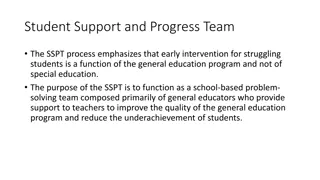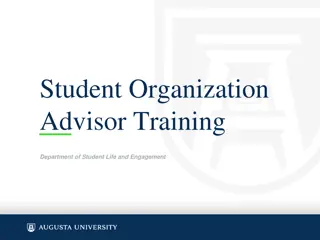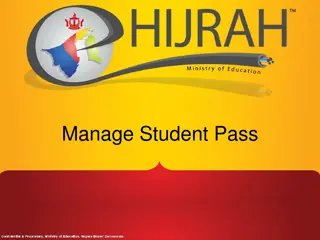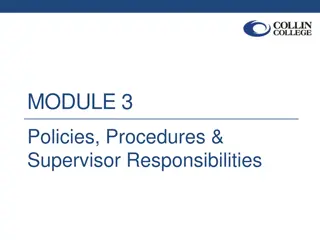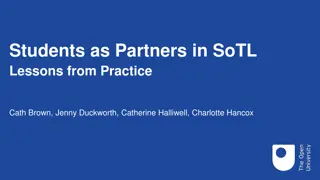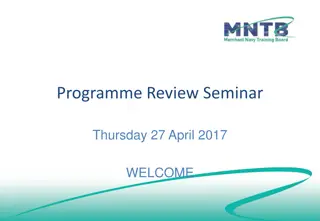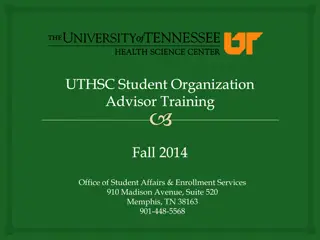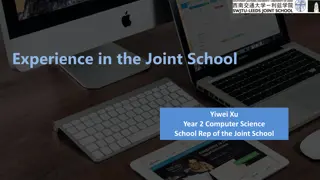Student Rep Training 2017-18 Overview
The Student Rep Training 2017-18 covers a comprehensive agenda including roles, responsibilities, quality assurance, support resources, and engagement opportunities for student representatives. Topics range from identifying and addressing academic issues to collaborating with Quality Enhancement Unit and Student Union. Students are encouraged to actively participate, provide feedback, and make a positive impact within the university community.
Download Presentation

Please find below an Image/Link to download the presentation.
The content on the website is provided AS IS for your information and personal use only. It may not be sold, licensed, or shared on other websites without obtaining consent from the author.If you encounter any issues during the download, it is possible that the publisher has removed the file from their server.
You are allowed to download the files provided on this website for personal or commercial use, subject to the condition that they are used lawfully. All files are the property of their respective owners.
The content on the website is provided AS IS for your information and personal use only. It may not be sold, licensed, or shared on other websites without obtaining consent from the author.
E N D
Presentation Transcript
Student Rep training 2017-18 Welcome! Please sign the register and take a seat
What todays session will cover Welcome & Ice-breaker Quality Assurance Role of a Student Rep Advice and Support Make yourself known Weblearn Course Sites Feedback Identifying & dealing with issues Course committee meetings Campaigning and taking action Evaluation Form
Getting started The university divided into six schools. Each school may itself be divided into subject areas. There should be student rep for each year of each course Student Reps identify and raise academic and related issues on behalf of their course mates, usually to their lecturer, module or course leader. Issues which remain unresolved or are more serious can be raised with the Student Experience & Outcomes (see handbook p16) who have a specific responsibility to respond to student concerns. Student reps can raise academic and related issues informally to staff, at course committee meetings and student rep forums. Student reps can ramie estates issues (physical infrastructure, heating, blocked toilets etc) by emailing ask@londonmet.ac.uk and IT issues by emailing ictservicedesk@londonmet.ac.uk
Quality Assurance Agency The QAA, along with HEFCE (Higher Education Funding Council England) act as Watchdogs for Higher Education in the UK. The university has to follow the UK Quality Code, which regulate quality and standards in the sector. The Quality Enhancement Unitat London Met is there to keep the University's Quality Framework and make sure the university is working towards the very highest quality and standards. They work closely with the schools in this regard. The Quality Enhancement Unit is VERY keen to work with student reps from all schools of London Met as student reps provide invaluable feedback. Catherine Connor, Head of Quality Enhancement Unit c.connor@londonmet.ac.uk Habib Rahman, Deputy Head of QEU, habib.rahman@londonmet.ac.uk Harvey Hurree, Quality Manager (Assurance & Information) h.hurree@londonmet.ac.uk
Student Rep - advice and support Student Rep handbook 2017-18 Student Rep Facebook groups (see p13 of handbook) Students Union website: https://www.londonmetsu.org.uk/studentreps and another page per school SU Officers & staff (see p15 & 19) Student Engagement Partnership (NUS and Higher Education sector collaboration) for best practice, training, support, engagement with institution etc): https://www.nusconnect.org.uk/the-student-engagement-partnership-tsepNUS Connect Student Engagement & Course Rep website: London Met student zone (for school and University information) http://student.londonmet.ac.uk/
Student Reps: Sabbatical Officers and senior school staff Sabbatical Officer with education remit: Florence Onwumere florence.onwumere@londonmet.ac.uk School Sabbatical Officer Student Experience & Outcomes staff member Guildhall School of Business & Law Tunde Toki <tunde.toki@londonmet.ac.uk Jan Bamford <j.bamford@londonmet.ac.uk> CASS School Georgia Robinson <georgia.robinson@londonmet.ac.uk Cecile Tschirhart <c.tschirhart@londonmet.ac.uk> School of Computing & Digital Media Florence Onwumere <florence.onwumere@londonmet.ac.uk Elena Moschini <e.moschini@londonmet.ac.uk> School of Human Science Florence Onwumere <florence.onwumere@londonmet.ac.uk Sheelagh Heugh <s.heugh@londonmet.ac.uk> School of Social Science School of Social Professions Mark Boansi <mark.boansi@londonmet.ac.uk> Steven Curtis <s.curtis@londonmet.ac.uk> Mark Boansi <mark.boansi@londonmet.ac.uk> Victoria Mummery <v.mummery@londonmet.ac.uk> Student Voice Coordinator: Eddie Rowley <E.Rowley@londonmet.ac.uk>
What is the role of a Student Rep To represent students views and opinions on all matters relating to teaching and learning in an effort to continuously improve the student learning experience in partnership with the University and Students Union. Identify relevant issues on the ground Raise issues and concerns with school Be a channel of communication between school, student and students union Feedback to course mates on any, some or no progress on the issues Provide general and specific feedback (positive and negative) to school Build strong working-relationship with course leader & module leader etc
Making yourself known Introduce yourself to your class mates and make regular announcements in class lecture shout-outs Collect the names and emails of the students on your course stay in regular contact Make use of new Course Sites feature on Weblearn (see next slide) Work with the sabbatical officers and other student reps Communicate information your receive from the students union, university, National Union of Students (NUS) and others Introduce yourself to and work with student reps for different years of your course and similar years of your course work together! Student Reps for each course are listed on the Students Union website on the page for each school under Student Reps (you need to log-in) e.g. www.londonmetsu.org.uk/studentreps/gsbl
Weblearn course sites This is a new weblearn feature which will much imprve the presence of student reps. You will need to email your course leader the following to activate it: Confirmation you wish to be mentioned on the Course Site Your email and photo (jpeg) Link to Student Rep page on SU website Link to a survey or google spreadsheet you may want to create to get feedback from course mates on their academic experience
Feedback What areas could you feedback on? Providing feedback to the teaching staff on the course is a key part of the job Teaching on the course Assessments (exams and coursework) Academic feedback from lecturers Style and delivery by academics Academic support Lab, studio and other specialist facilities Learning resources (such as the library, weblearn) Rooming and time-tabling Placements and other course specific activities
Identifying issues Group Activity 1 Resource: Scenario cards Spend a few minutes reading each scenario individually to start with Then discuss the scenarios in your group As a group please divide the scenarios up between issues which you think are within the remit of a student rep to deal with and issues which you feel do not fall within the remit of a student rep Nominate one group member who is going to feed this back to the rest of the class
Ways to tackle issues Do other students feel it is an issue? Do a number feel the same? Discuss it with other students reps and sabbatical officers. If its a wider issue you might find the SU are already aware of it and have raised it. If so try to gather some evidence. You could summarise the issue in an email and ask course mates if you can add their name to it, demonstrating that its is widely felt. Raise it with you lecturer, module or course leader via email or ideally in person. If needed ask to meet them at a pre-arranged time so you can sit down and discuss the issue in a quiet environment. Raise at the next course committee meeting if it has not been resolved If it remains unresolved then you can escalate it by raising it with Student Experience & Outcomes Coordinator for your school. (p16 handbook) If no satisfactory response or resolution, speak to the sabbatical officer again and we can discuss option escalation options
Solving issues Group Activity 2 Resource: Decision-making flowchart (handbook p10-11) and what we have covered in the train so far Take one issue which you as a group have decided is within the remit of a student rep. Draw up a 4-5 point action plan covering the steps you are now going to take with the aim being to get the issue resolved. Think about what you are going to do? who are you going to speak to? Remember you will need to stay in communication wit all stakeholders such as students, sabbatical officers and staff. Set out your action plan in bullet point form and have someone ready to feed it back to the rest of the class
Course Committee Structure Ask your course leader when your course committee meeting is and write it in your diary Course committees usually meet once each semester Course leaders will chair them. Staff who teach on the course and the student reps should attend. Library and Quality Enhancement Unit may also attend Should consider teaching, teaching and administrative issues surrounding the course Minutes are taken of course committee meetings and the minutes logged. You should receive copies of the minutes. Course Committees are useful but by no means the only forums to raise issues so don t wait until they come around. Be ready to raise issues as and when they crop up throughout the year.
Before a course committee meeting Meet course leader beforehand so they can let you know what to expect Read the agenda, be aware what is and what is not on it. Make sure you have identified the issues you wish to raise and have feedback from your class mates to back it up If you have a complicated issue to raise or/and have the research/evidence to produce e.g. survey, emails from course mates; send them to the course leader before the committee meeting so they have a chance to digest the issue. Liaise with other student rep who may attend (ask you course leader to put you in touch or look on the SU website) Speak to your school sabbatical officer, ask them to come along with you Makes sure you know where the meeting is and be on time. Being late will not help your cause!
During a course committee meeting Listen Raise hand to speak Raise you issues clearly and concisely Present any evidence you have Don t be confrontational, work in partnership Take notes, ask for clarification if you are not sure what is being said Remembers to note down action points If you don t understand a term used, ask! At the end of the meeting clarify the decisions taken and when they are to be actioned (this prevents drift) Confirm the date of the next meeting. Request a follow-up meeting to deal with a specific issues if required. Make sure the secretary has your email
After a course committee meeting If other Student Reps are present have a debrief straight away Write up you notes and action points right away Feedback to your course mates and your sabbatical officer ASAP If you are not happy with the conduct of the meeting then speak to another academic in your faculty and express your concern Provide any constructive criticism you have of the committee to the school
Campaigning and taking action Sometimes you may have a deeply felt and winnable issue which you can t make any real progress on. In this situation you may decide to launch a campaign and take some action. In this situation you should discuss with the students union officers. They, along with students union staff can assist you in planning what to do
Careers and Employability Service Student Reps can use our services for your own development and please regularly inform and remind other students to use services : Careers advice and guidance for planning, CVs, applications, interviews, employability skills, postgrad study Book through the student Hubs, call 0207 133 2094 or careers.studentservices@londonmet.ac.uk
Careers and Employability Service Job Shop employer vacancies, on campus jobs and volunteering opportunities www.londonmet.ac.uk/careers Events and Workshops - http://londonmetcareer.eventbrite.co.uk







